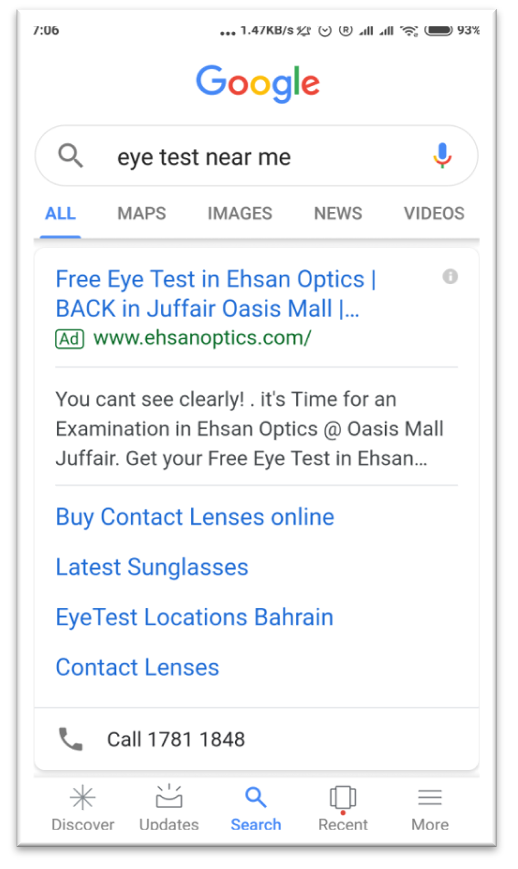
In some places, like Bahrain, marketing people are so fixated on Instagram as an acquisition tool, that they completely ignore search advertising like Google Ads.

Mobile Ads replace Organic results.
Our ‘Mastering Internet Marketing‘ course last week brought up some interesting insights – one of them being that if you use Google Ads for customers searching on mobile devices, and you use the Google Ad extensions like callouts, then you can capture the entire screen at the top of a SERP, blocking out all organic results above the fold.
There’s a bit of jargon in there, so let’s unpack it.
Glossary of SEO and Search Advertising Terms
Search Engine Results Page (SERP) : A list of results that are returned after the user has entered their search term or keyword. Paid listings appear at the top of the SERP above ‘Organic’ results.
Organic Search Result : A page that is shown at the top of the SERP because Google has determined it is the most relevant page to be shown for that search term. This position is determined by a constantly changing algorythm, but some simple Search Engine Optimisation (SEO) practises can help you get ‘free’ traffic from these positions.
Above the Fold : A leftover from the days when large newspapers were folded in half. Ads had more value ‘above the fold’. In screen terms, ‘Above the fold’ means what the user can see without having to scroll.
Google Ad Extensions
Google Text Ads now allow you, the advertiser, to add ‘extensions‘ to your ad which increase the real estate that the ad takes up on a phone. These include sitelink extensions, callouts and structured snippets. Google Ads also allows for a ‘Call’ action to be added to the text advertisement.
If all of these features are used then the ad takes up most, if not all of a mobile screen, pushing all other ads and organic results below the fold.
Is it Worth Doing SEO?
The goal of Search Engine Optimisation, or SEO, is for your page to be displayed at the top of the SERP organically for a desired search term or keyword.
Every time a user clicks this link, you are benefiting from ‘Free’ traffic. Users clicking organic links can save you a lot of money on your Cost Per Click (CPC) budget – but that’s if they see it.
And so, there may be some opportunity here, depending on your industry and your market.
Opportunity One – Less Instagram, More SEO.
If you are in an emerging market where Instagram is favoured over Google Ads and noboy is bidding against your keywords, then being at the top of the organic search results saves you money.
Opportunity Two – Block Out Your Competitors.
Just as above, if there are not many companies using Google Ads to drive traffic and you do not rank at the top of the SERP organically, then you can capture a large amount of real estate for a relatively low spend.
In fact, best practice would say that you do both – use Content Marketing to create pages that are relevant for the search terms that you want to be found for, use SEO to get them to the top of the SERP, AND allocate some budget to search advertising, utilising the new Google Ad extensions.